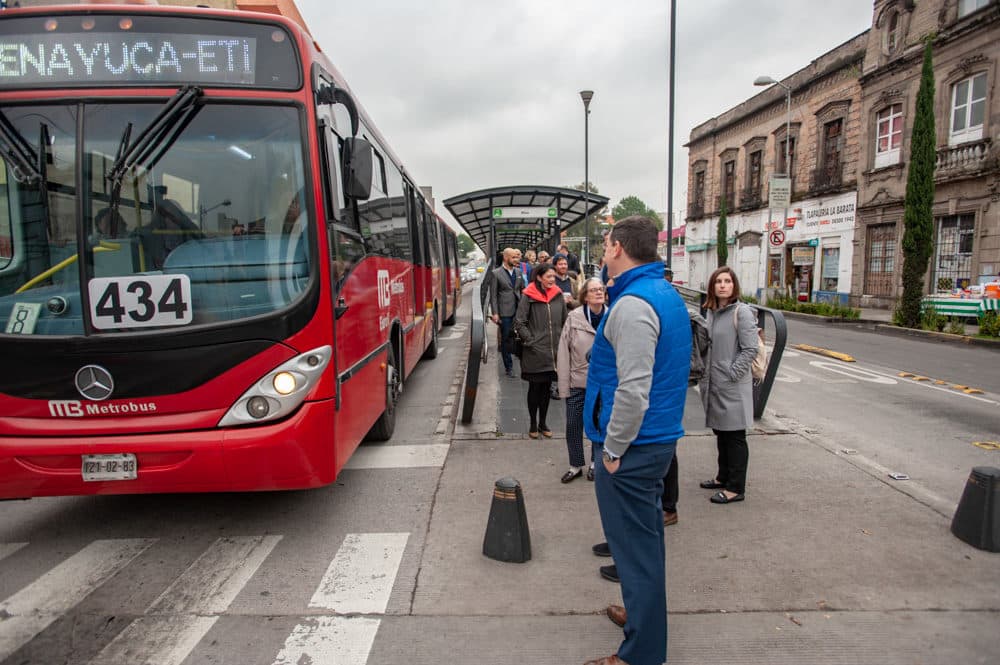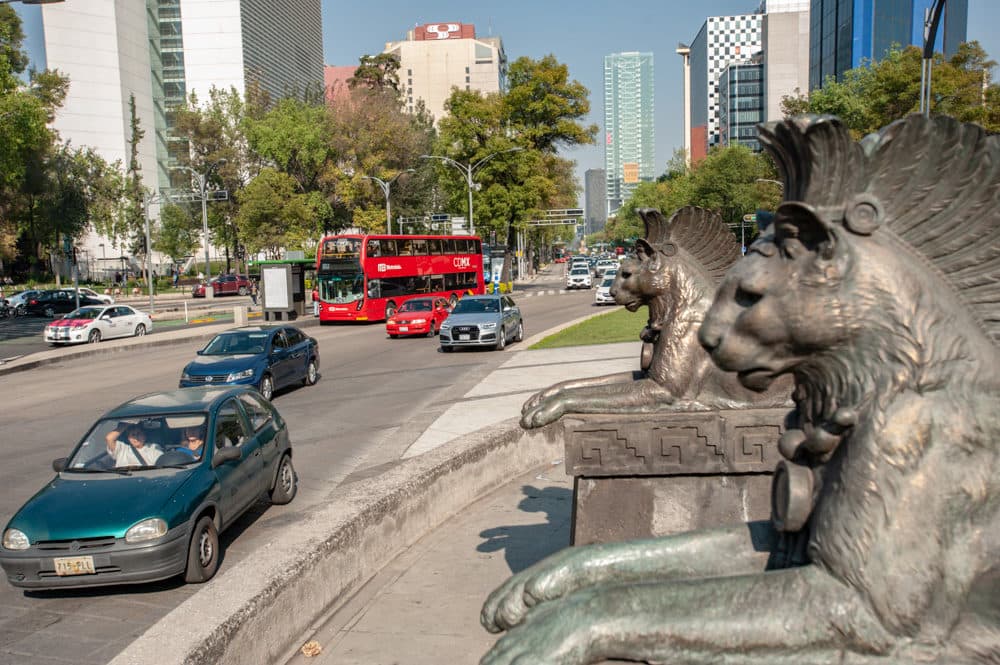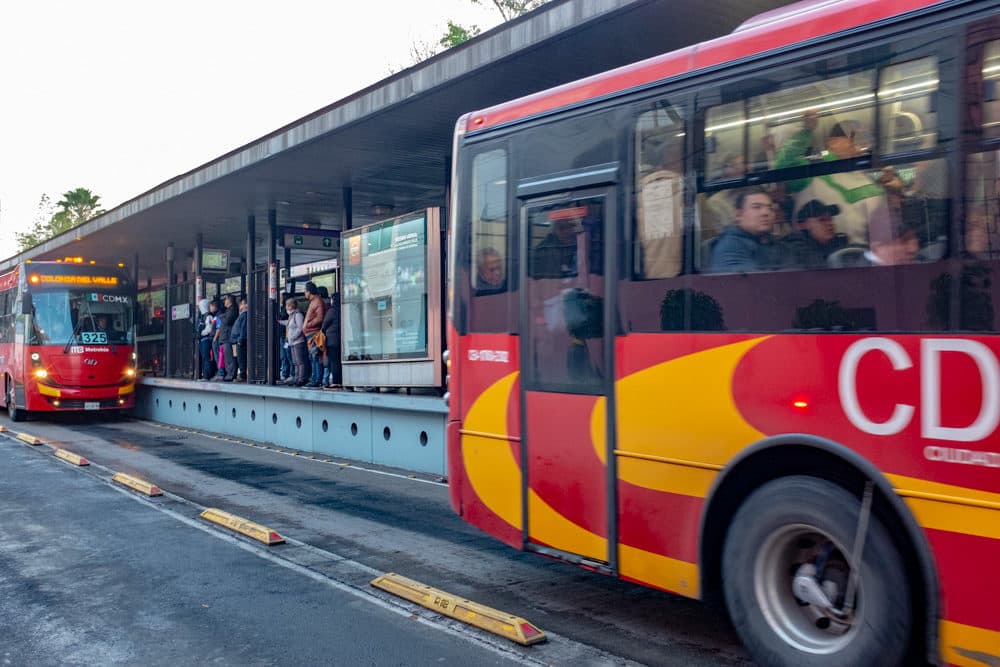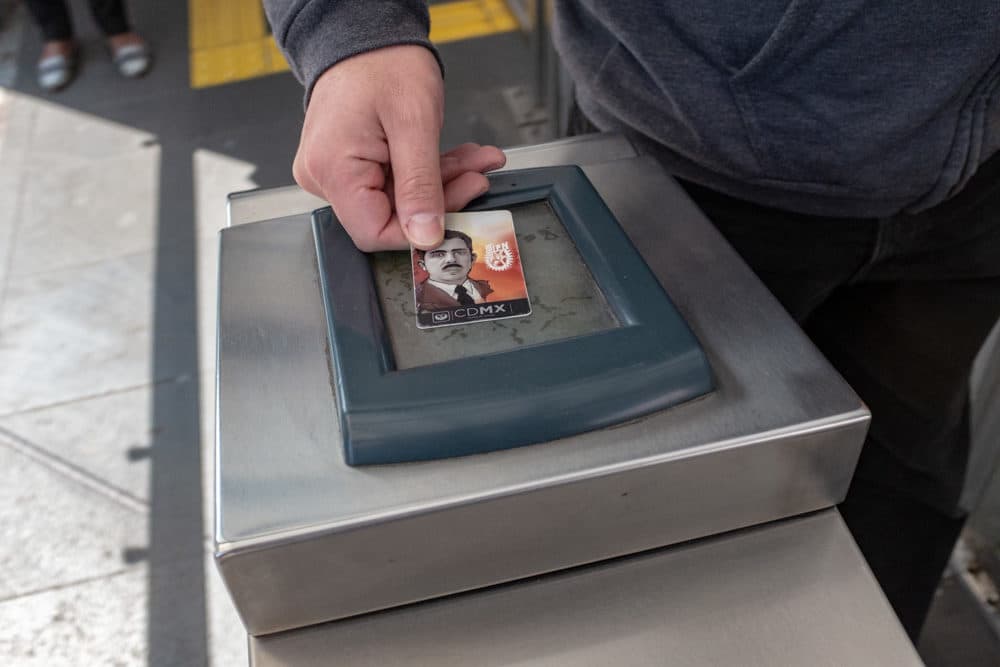Advertisement
¡Viva Buses!
Bad Transit Is Bad For Business. Boston Execs Went To Mexico City In Search Of Fixes

Part 3 of a series. Here are Parts 1, 2 and 4.
Este reporte tambien está disponible en español.
A group from Boston's Alliance for Business Leadership (ABL) files onto a bright red bus in downtown Mexico City on a Wednesday morning.
But this isn't just any bus. It's part of the city's bus rapid transit system, called Metrobús.
Metrobús has exclusive lanes, which allow the buses to speed past car traffic. The 15 business leaders from ABL are here to ride lots of buses. They want to see if this system can work in Boston. They're also here to meet with officials and transit experts to gather information about bus rapid transit — or BRT.
Transportation is critical to businesses. Traffic makes people late to work, delays deliveries and, as we all know, stresses everyone out. Transportation problems even cause workers to consider changing jobs or leaving the area altogether, according to a recent MassINC Polling Group survey. The group from Boston hopes an innovative system like Mexico City's Metrobús can help solve our traffic woes.
"We don't have anything like this in Boston," ABL president Jesse Mermell says. "We have things that are, you know, BRT-adjacent but not the whole way there. And so one of the reasons we wanted to bring people here was to actually see it and experience it."
The group rides a few different lines in the system, including the newest line with double-decker buses that travel down Paseo de La Reforma, a picturesque boulevard. Another line goes through narrow streets in the historic city center.
Advertisement

"Having seen it now with my own eyes, it very much feels like something that is an upgrade, like an extra — this amazing thing that you could have in your community or in your neighborhood," Mermell says.
The other business leaders are pretty impressed too. Much of what they like has to do with Metrobús's unique features. For example, riders pay at stations, so there's no holdup when they board the bus.
Dave McLoughlin says transit is the first thing he thinks about as the northeast general manager for WeWork, the shared office space company. He wants to make sure people can get to his company's coworking locations. He says Metrobús is a much better bus experience.
"I felt like I was on the subway," McLoughlin says. "And there's two things that give you that feeling: One is how quickly people are on and off the bus, really fast. I had never thought about that before. And then the other one is just the speed in the dedicated lane. You're moving at a pace that feels like you're on the Red Line or the Orange Line or something."
The speed and efficiency of the system is also on Beverly Armstrong's mind. She's the owner of Brazo Fuerte Artisanal Beer in Watertown and says Boston's bogged-down streets affect her business.
"I want my customers to be able to ride comfortably to my facility. I want to be able to get my products around the city, and transportation issues in Boston are a huge hindrance to that," Armstrong says.

Mexico City's bus rapid transit has reduced travel times for riders by 40 percent, according to Metrobús. But the system is overcrowded and needs to expand to reach more parts of the city.
And that frustrates some business leaders in Mexico City, like Maite Ramos. She heads the mobility commission for Confederación Patronal de la República Mexicana (COPARMEX), a national business group in Mexico.
"If we're waiting for the government to invest and build everything we need, it is going to be very difficult because of the lack of resources," Ramos says.
Businesses need to step up and invest in public transit to help meet the needs of the 21 million people in Mexico City's metro area, Ramos says.
"We as business leaders need to understand that if we want better companies and better cities ... we have to build them," Ramos says.
The Boston business leaders spent three days in Mexico City. They're now back in Boston and can't stop thinking about buses.
"I really didn't know I could love buses so much, which sounds like an incredibly nerdy thing to say," Mermell says.
"I really didn't know I could love buses so much."
Jesse Mermell, president of Boston's Alliance for Business Leadership
She and the members of her group have become "evangelists" for buses. They've been meeting with local officials and others in the business community to share their experience.
"We're doing a lot of things like that, just really being out there and making sure that public transit — and buses in particular — are top of mind as we are really smack dab in the middle of this giant civic debate about what comes next for transportation in Massachusetts," Mermell says.
Other business groups are also focused on transportation. It's the top policy priority for the senior executives at the Massachusetts Business Roundtable. And local chambers of commerce have convened discussions about transit. Massachusetts House Speaker Robert DeLeo even called on business leaders to come up with ideas to solve the region's traffic challenges.
But the big question is: How do you pay for it?
One way might be the New Balance approach. The sneaker company put up $20 million to build its own commuter rail station — called Boston Landing.
It was a splashy affair at the ribbon-cutting ceremony back in 2017. The Dropkick Murphys' "I'm Shipping Up To Boston" blared through speakers in a large white tent outside the station. State and local officials praised the company for investing in transportation. Brian Shortsleeve, the MBTA's general manager at the time, said such developments are vital to the growth of public transit.
"This you're seeing today is an example of what public-private partnerships are all about," Shortsleeve said. "It's a big win for the riders, it's a win for the taxpayers, it's going to be a win for the people that are going to use this station every day."
Private developers have helped fund other transit projects too — like the Green Line extension and Assembly Station. But the region's larger transit needs can't just wait for a major company to come along and foot the bill.
Local business leaders say everything is on the table right now — including taxes to generate revenue for transportation.
Mermell says if the business community can unite on a policy, it could help push transit forward.
"I don't care if you haven't been on a bus in 20 or 30 years, or if you've never taken the T. If you're in the business community, you are a user of public transit," Mermell says. "That's probably how your employees get to and from work. It's how your customers get to and from work. And so it is essential that the entire business community focus on transportation as a whole and public transit in particular."
And there's lots to think about, whether it's bus rapid transit like Mexico City has, or something else. At least now, Mermell and others say, local business leaders seem ready to engage in a critical debate about transportation.

This segment aired on May 1, 2019.
